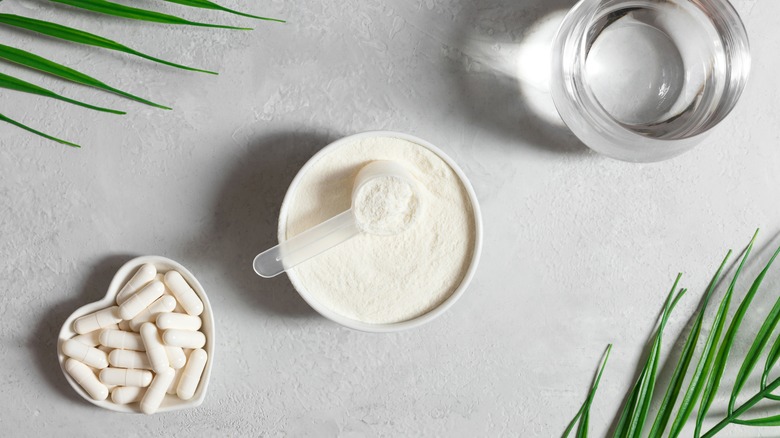What Are The 5 Types Of Collagen In Your Body?
According to WebMD, the human body is home to about 10,000 proteins. As the body's most abundant protein, collagen accounts for about 30% of the body's total protein accumulation and is the main building block of the skin, ligaments, muscles, tendons, and various tissues, says the Cleveland Clinic. According to the clinic, collagen is made from essential amino acids like glycine, proline, and hydroxyproline, which form protein fibrils when combined.
According to Medical News Today, collagen is also crucial in holding your cells together. In addition to assisting with keeping the joints healthy, it gives the skin structure and strength, ensuring it doesn't lose its natural elastic and stretchy nature. It can also help to promote a healthy cardiovascular system, as well as helping to protect other organs in the body. Given the expansiveness of collagen and its variety of uses across the body, it's clear how important this protein is to human health. Interestingly, the protein comes in numerous types — each contributing in its own way to the overall functioning of the body.
The 5 types of collagen
According to a 2021 study published in the journal Plastic and Aesthetic Research, 28 different collagens have been identified, each with their own different structures. However, there are five main types, says the Cleveland Clinic. According to the clinic, collagen types differ by the specific body parts in which they operate and other characteristics — for example, type I collagen is one of the most abundant and accounts for about 90% of the collagen in your body. It helps with wound healing and can be found in areas like tendons and ligaments (via WebMD).
Type II collagen is found in the elastic cartilage around the joints, while type III functions in the muscles, essential organs, and arteries (via the Cleveland Clinic). According to the clinic, type IV and V collagens are found in the skin layers. Type V also exists in other areas like the corneas of your eyes, the hair, and the tissue of the placenta. According to a 2016 article published in the journal The Anatomical Record, type V collagen functions by interacting with structural proteins and collagens to modulate cellular behavior and functions, and provide structural integrity to tissue.
Uses of collagen
According to the Cleveland Clinic, since collagen can be broken down and absorbed in the body, it has various uses in medicine and cosmetology. For example, it can be injected into the skin to help reduce wrinkles and lines. It can also be used to improve oral health since it curtails the growth of gum tissues which may grow into wounds in the teeth — thus affording your tooth cells enough time to regrow, says the clinic. Collagen can also impact wound healing, hence why it's sometimes found in wound healing gels and powders (via Medical News Today). Specific areas in which collagen might help during wound healing include inflammation reduction, bleeding control, tissue regeneration, and skin elasticity restoration, per the source.
Some collagen types are noted for their potential to complement cartilage and bones, making them essential in osteoarthritis treatment. A 2018 randomized control trial showed that patients who took oral collagen supplements reported a significant reduction in joint pain. In fact, joint mobility among the patients improved by 39% after taking collagen supplements.
According to News-Medical.net, collagen can also play an important role in cardiology since the heart valves consist of collagen tissues, especially when factors like age cause the valve to become stiff and less functional.
Benefits of taking collagen
Although the body naturally produces collagen, production levels slow down as we age. According to Scientific American, on average, we produce 1% less collagen each year after age 20. This is when collagen supplementation might help. According to a 2019 review published in the Journal of Drugs in Dermatology, women who took 2.5 to 10 grams of collagen daily for up to 24 weeks saw improvements in skin hydration levels and elasticity.
According to Healthline, bones are made primarily of collagen, and because of this, bone mass can also deteriorate with age, increasing your risk of bone fractures. Therefore, supplementing collagen might help reduce your risk of these issues. According to a 2016 review published in the journal Revista Brasileira de Geriatria e Gerontologia, collagen supplements may help prevent bone loss by adding strength and structure. Taking in collagen might also help with hair and nail growth. According to WebMD, a significant increase in hair quantity and thickness among women with thinning hair was observed in one study. The study also noted an improvement in scalp coverage after starting daily collagen therapy. Another study also noted faster nail growth with fewer chances of chipped nails — after only four weeks of daily collagen supplementation, says the source.
What causes the loss of collagen?
Even though age-induced collagen loss is inevitable, several dietary and lifestyle choices can cause you to lose collagen faster. For example, cigarette smoking and drinking too much alcohol can speed up the effects of aging, as they affect collagen production and the mechanisms for skin repair, says Healthline. Also, consuming highly processed and sugary foods can exacerbate a bodily process called glycation, which arrests collagen turnover and makes it harder for collagen to interact with other building blocks of the body.
Too much exposure to sunlight can also affect collagen production and make the skin less elastic. When the sun's UV rays penetrate into the dermis, the skin's middle layer, it can damage collagen fibers (via Skin Cancer Foundation). After too much sun exposure, the body's depleted collagen levels may cause your skin to become leathery and wrinkled.
How can you identify that your collagen levels are dropping? It's hard to measure how much collagen you have left. However, some symptoms of low collagen levels include joint pain, stiff ligaments or tendons, and muscle weakness, says WebMD.
Foods that aid collagen production
According to Healthline, consuming collagen-rich foods might help boost collagen production and create the building blocks for healthy skin. One food in particular is bone broth (animal bone boiled in water). Besides the rich collagen content, it offers essential nutrients like calcium and magnesium. Chicken is also a healthy source of collagen. When treating arthritis, one 2012 study published in the journal Clinical Interventions in Aging used chicken cartilage as a source of collagen. Eggs and poultry are also good for collagen production in the body since they contain proline, an essential amino acid proven to increase collagen levels and boost strength (via LiveScience). According to the source, some poultry products also contain amino acids that can stimulate collagen production.
Vitamin C-rich fruits and vegetables might also help increase the body's collagen production ability, says WebMD. Examples include citrus fruits, papaya, blueberries, leafy greens, cauliflower, and broccoli. These fruits and vegetables may be beneficial to vegetarians who may find it difficult to eat fish and meat for their collagen benefits.






